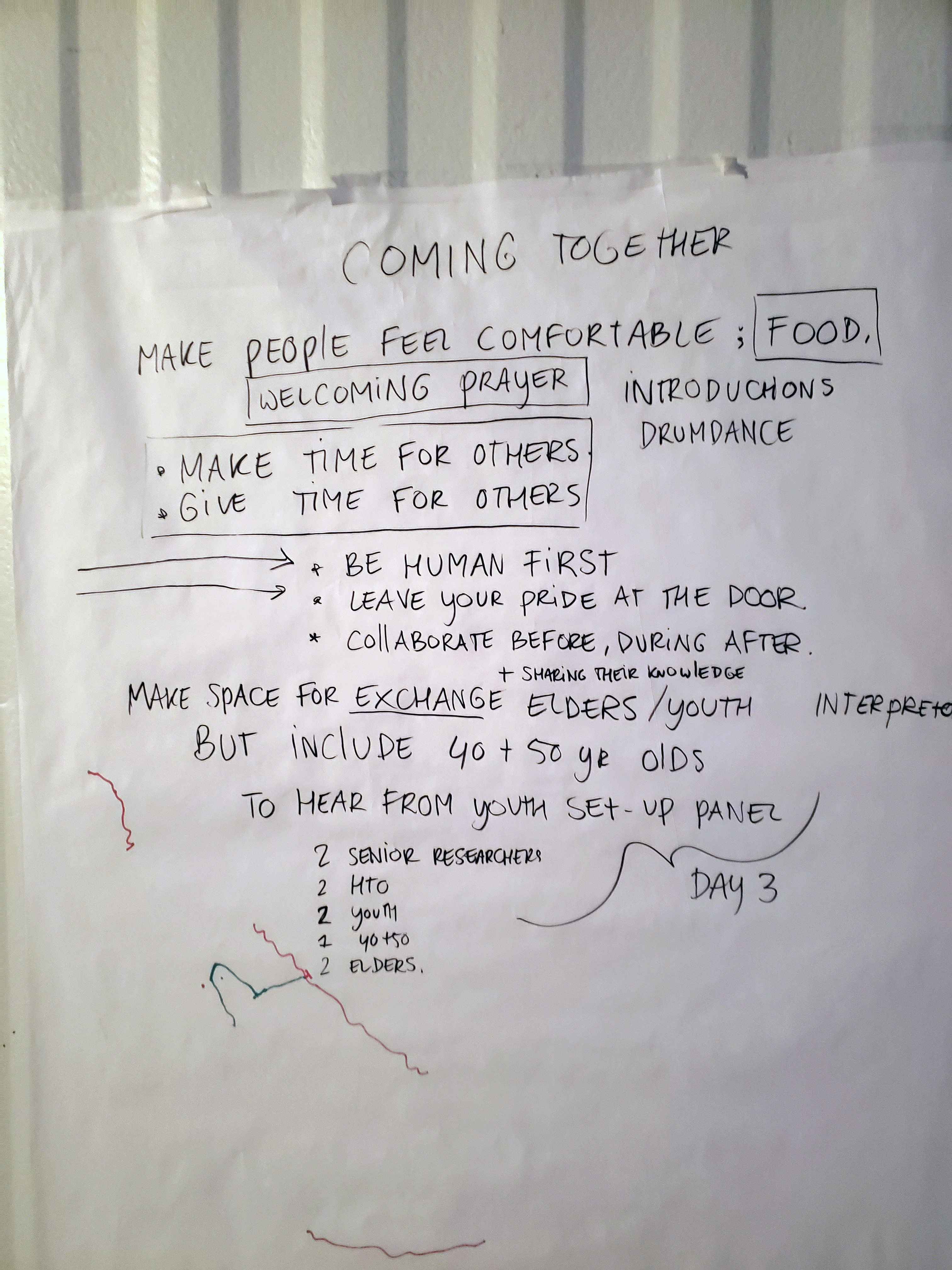Point of Beginning (Pre-)workshops: Difference between revisions
| Line 75: | Line 75: | ||
<span class="redirective ice pressure ridge link" data-page-title="Flat Tire" data-section-id="0" data-encounter-type="Ice-pressure_ridge">[[Lookout for Percy]]</span> | <span class="redirective ice pressure ridge link" data-page-title="Flat Tire" data-section-id="0" data-encounter-type="Ice-pressure_ridge">[[Flat Tire|Lookout for Percy]]</span> | ||
Revision as of 22:23, 18 January 2025
This is one of three case studies conducted as part of my research that seeks to explore how ethical knowledge conciliation may come to matter within community-based polar bear research. This particular case study cuts across the preparation and the activities that were part of the final BearWatch workshops in both Gjoa Haven and Coral Harbour.
Design Consultation Pre-workshop & Workshop GH
When I had visited Gjoa Haven in the spring of 2022 to screen the videos I had edited with film-material shot in 2021, I also took the opportunity to interview some of the community's main collaborators of the project. I was seeking to gain some insights on how they would prefer the BearWatch final workshops to be designed and organized.
One of the most helpful interviews I conducted that Spring was with Elder Jimmy Qirqut, who made it clear that such decisions would need to be derived by consensus. He advised me, if I wanted to incorporate the input of multiple voices and input from the community - also outside of the Gjoa Haven HTA board, to organize a (multiple day) meeting with several elders and youth of different genders. He instructed me to see if I could rent the elder-youth cabin from the hamlet office, and organize transport to bring people up to the cabin. He also advised me to advertise this meeting over the radio, to see if people would be interested. Finally, I should make sure the cabin would be warm enough and comfortable for everyone to spend time in.
2 day Preworkshop GH
In the late Fall of 2022, I returned to the community of Gjoa Haven to start preparing for the final workshops. Based on Jimmy Qirqut's instructions, that I had received the previous Spring and with the sanction of the Gjoa Haven HTA, we started to prepare a two-day pre-workshop, that was meant to inform the processes of the final workshop.
As the agenda for the three-day final workshop had already been decided on by the BearWatch project PI's and the GJoa Haven HTA, the pre-workshop was to inform processes like appropriate formatting of sessions, and the optimal conditions for community members to participate, draft workshop guidelines and suggested terms of engagement.
Despite calling for participants for the pre-workshop on the radio for three-days, we could not successfully find people through this way. Eventually we selected a group of people through opportunistic and associative sampling. Inviting Jimmy Qirqut who had instructed how to organize this pre-workshop, we asked him who he would like there to be in addition. He repeated it should be a mix of ages and genders. We informed through our own network to compile a group of 9 people: Four youth: two males (Gibson Porter and Dustin Aitoquok), two females (Robin Porter and Angeline Aglukkaq), and three elders: two males (Jimmy Qirqut and David Siksik) and one female (Mary), one female interpretor (Tuppittia Qitsualik), and me, Saskia de Wildt.
Invitation: set-up the pre-workshop
Terms of Engagement
After two-days in the elder-youth cabin, we had drafted a comprehensive set of guidelines and terms of engagement for the final workshops.
These guidelines were divided in general "good practices", and guidelines particular to the agenda that was set for the final workshop.

These are the general guidelines:
General good practice:
1. Be human first, before any type of position
2. Leave your pride on the plane
3. Include the community before, during and after your research.
Hold space:
- Presenting/sharing your knowledge. (This is your gift to the community)
- Make time/space for people to ask you questions (so they can learn from you)
- Don’t speak over someone that is already speaking.
Include the middle-age group; The working people, 40/50 year olds, not just youth and elders.
At the end of each session each of the speakers should be individually named and explicitly thanked.
Prepare well.
Specifically during events there should be space for elders and youth to have dialogue, discussions.
We should look out for ALL youth! Including the youth that are looked down on a bit.
It is very important to have and keep set times.
Start packing up, Percy is on his way with the truck so you can give people rides home.
